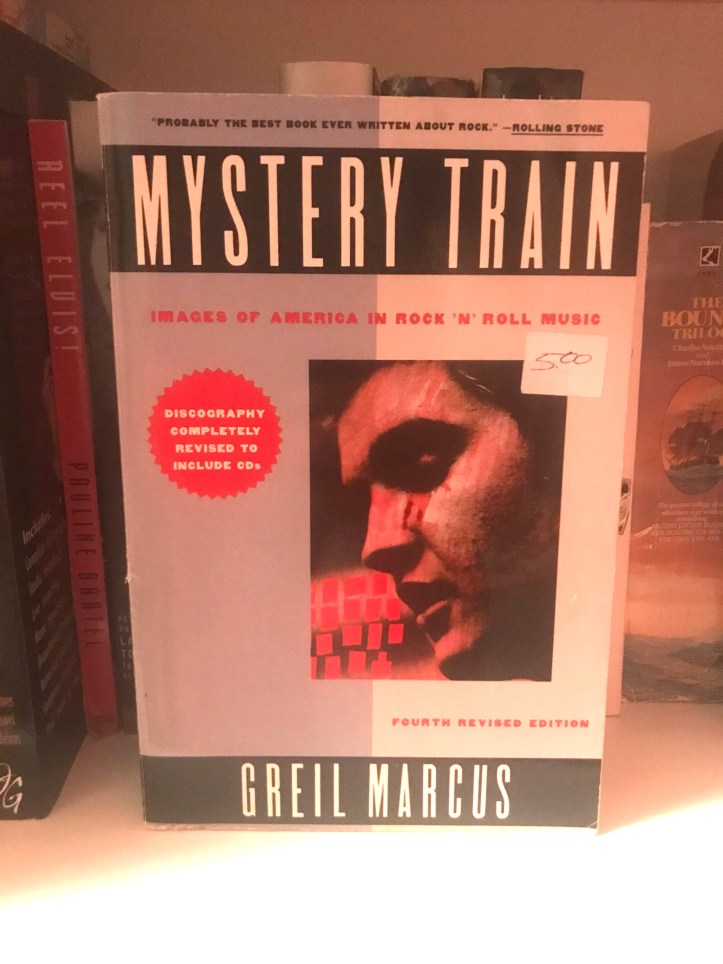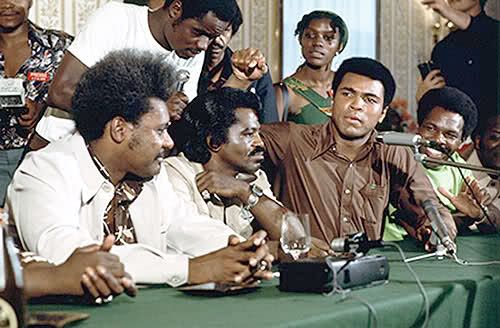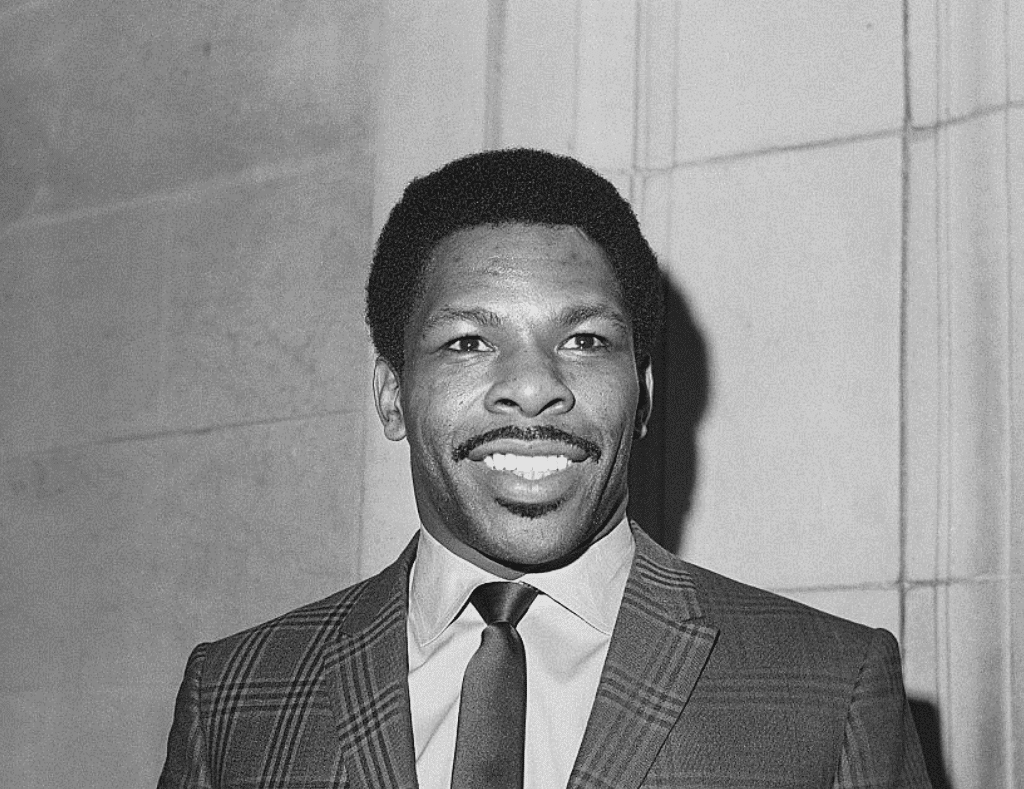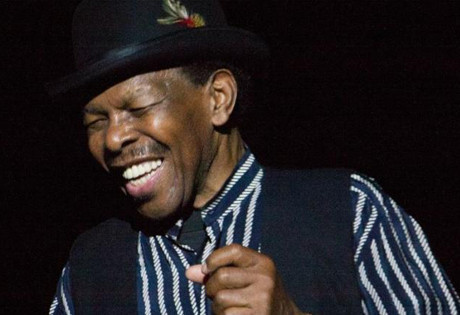
Throughout 2019, I went hog wild. I bought scores of records. I wish I had counted them. I bought them at garage sales and thrift stores. Close to home and on vacation. I bought them in Florida, Canonsburg & Latrobe, PA and Steubenville, OH. Every time I buy a record, I put it on the “Up Next” shelf and, when it’s time to “have a record”, I will grab the one that is Up Next. While I don’t know how many I bought in 2019, I can tell you that I am currently finally getting to records that I bought well over a year ago. I say all that to say all this. One night, it was time for a record and I noticed that a Lloyd Price album I bought at a garage sale was up next. It was his fourth LP, The Fantastic Lloyd Price, one that places Lloyd in front of a big band, singing standards. I only knew Price as an R&B singer so this album made me think there was more to him than I knew so I looked him up. What I learned was fascinating enough to suggest to my boss at Norwood Media’s The Doo-Wop Express that we should feature Lloyd in our monthly blog post. I also thought I should let you all in on what I discovered.
Lloyd Price was born in 1933 in a suburb of New Orleans and had formal training on both trumpet and piano. His mother owned and operated a restaurant that fascinated young Lloyd and implanted in him a lifelong interest in food and business.

By the early 1950’s, Lloyd was working at a New Orleans radio station writing jingles and providing ad copy for commercials. And Price had a catchphrase; “Lawdy, Miss Clawdy!”. Price used this phrase to sell various goods in commercials, one of which ran “Lawdy, Miss Clawdy, drink Maxwell House coffee!”. The jingle he wrote to go with this commercial proved to be so popular that he developed it into a full-length song. At around the same time, the owner of Specialty Records arrived in New Orleans looking for singers who had what was becoming known as the “New Orleans sound”. Nineteen-year-old Price auditioned for him, performing “Lawdy Miss Clawdy” and impressing all in attendance. A band was assembled to record the song that featured Earl Palmer on drums and Fats Domino on piano. When the record was released in 1952, it was a huge hit. “Lawdy Miss Clawdy” spent half the year on the R&B charts including a 7-week stay at #1. It is a prototypical rock & roll song and is today considered part of the origin of the genre.
In 1954, after recording several less successful sides for Specialty, Price was drafted and sent to Korea. There, he fronted a large band that played swing music for the troops. Things did not look promising for Lloyd Price when he returned from overseas. Not only was his new big band jump blues style not going to fly Stateside but added to that his record label was focusing all its energy on Little Richard. Necessity caused Price to become a pioneering businessman and start his own record company, the Kent Recording Company. As his label’s only artist and one of its few employees, it was up to him to write, to produce and to play piano on what would be the debut for his label. “Just Because” started to gain attention regionally but to reach a national audience the record needed a big company behind it. Enter ABC-Paramount and the tune was re-released a year later becoming Lloyd’s first hit on the pop charts, reaching the Top 30 and peaking at #3 on the R&B chart. For the next couple of years, Lloyd Price released successful records such as his legendary recording of “Stagger Lee” which was a Top Ten record worldwide and topped both the pop and R&B listings in the US. Added to this was the song that gave Price his nickname, “Mr. Personality”; “Personality” was another international success, reaching #2 pop US and #1 R&B US. Later in 1959, Price added “I’m Gonna Get Married”, another R&B chart-topper.

“Stagger Lee” certainly warrants some discussion. There are many spellings of the title of this song that was written about Lee Shelton, a black pimp who was known around St. Louis as one of the Macks, a group of pimps who were not just “businessmen” but men who were flashy dressers and obvious street corner personalities. Shelton acquired the nickname “Stag Lee” or “Stack Lee”; the variants are as numerous as the accounts of where the nickname came from.
According to newspaper reports the next day, Christmas night, 1895, was decidedly lacking in peace in “the saloon of Bill Curtis” at the corner of Eleventh and Morgan in St. Louis. Shelton was drinking with a friend of his named Billy Lyons and, indeed, the two were “feeling in exuberant spirits”. Then they both made a fatal mistake; they started talking politics. Each man became enraged and attacked the other’s hat, an effrontery that Shelton could not abide. A struggle ensued and Lyons was shot, eventually dying of his injuries. Shelton was convicted of murder and sentenced to 25 years. He was paroled in 1909 – after serving roughly 14 years – but landed in prison again two years later. He eventually died in prison in 1912.
The story of Stagger Lee entered the African-American lexicon of song almost immediately. As early as 1897 – a mere two years after the murder of Billy – the tune appeared as a work song or field holler sung by black labourers. Interestingly, the song was first recorded by the very “white” Fred Waring and the Pennsylvanians in 1923 and it was a hit for them. The song was recorded numerous other times before Price got to it in 1958.

Stagger Lee as myth has grown to mammoth proportions, particularly in the black community. The person of “Stagger Lee” has come to represent the prototype to many African-American men of the “gangster type”, a type that came to prominent fruition in the “blaxploitation” films of the 1970’s and the rap music of the 1990’s and beyond. Greil Marcus has dug into the myth of “Staggerlee” perhaps more so than anyone in his book Mystery Train. Relating the myth to soul musician Sly Stone, Marcus paints this mythical figure as a black man who dominates a black world and who cannot be tamed by anyone in it – and certainly not by whites on the outside. He waxes lyrical on Staggerlee as a dominant force; one that exudes strength while denying the existence of law and order in an effort to succeed at any cost. Marcus says African-Americans feel about Staggerlee the way whites feel about westerns and makes a point of the fact that, as the Civil Rights Movement fought to gain hold in America, Staggerlee represented “a fantasy of no limits for a people who live within a labyrinth of limits every day of their lives”. All that being said, for many today, Lloyd Price’s version is certainly the most popular and the only rendering that many music fans can reference. The immense history of the Staggerlee myth adds weight to Price’s recording.
As his own hit singles began to slow, Lloyd Price continued in the business of making records, forming Double L Records in 1962 and giving singer Wilson Pickett his start. When, in 1969, his partner was murdered, Price lost his fire and moved for a time to Africa, living in Ghana and Nigeria. When he returned to the States, he again started another record label and also a night club in New York. He went into boxing promotion and worked with Don King on Muhammad Ali’s “Rumble in the Jungle” fight. (Lloyd was portrayed by Vondie Curtis-Hall in the TV film Don King: Only in America from 1997) Never one to sit still, Lloyd Price also went into construction, building 42 town houses in the Bronx. Through the 1990’s, Price joined many others of his vintage touring the country in soul music revival revues.

However, Lloyd Price did not go quietly off into retirement. Recalling perhaps the restaurant his mother ran when he was a child, Price went into the food business himself. Lloyd operates Lloyd Price Icon Food Brands, Inc., located in Pound Ridge, New York. Dun & Bradstreet lists Price as “Chairman of the Board, Chief Executive Officer and President”. His “Lawdy Miss Clawdy” line of foods offers items such as canned greens, sweet potato cookies, Lloyd Price’s Soulful ‘n’ Smooth Grits and an Energy-2-Eat bar.

Between 1958 and 1960, Lloyd Price placed eight songs in the pop Top 40, added to this are his three #1’s and ten that reached the Top 20 on the R&B charts. This is not to mention the recording of seminal classics like “Lawdy Miss Clawdy” – his own composition – and “Stagger Lee”. Small combo R&B, big band jump blues and singer in front of a large orchestra, Lloyd Price really could – and did – do it all. His songs have been recorded over 500 times by some of the greatest artists of all-time, including Elvis Presley, the Beatles, James Brown, Jimi Hendrix and others. Consider that “Lawdy Miss Clawdy” alone has been covered over 100 times. Maybe you guys can help me out on two points. Firstly, I read in an article at The Hype Magazine that Frank Sinatra had covered Lloyd Price. I’m very skeptical and I cannot find corroboration anywhere that Sinatra covered Price. And second, Lloyd’s Facebook page states that Sinatra once spoke at a community college in San Diego. In response to a query from a Professor Greenberg, Frank stated: “Lloyd Price is the most complete entertainer I’ve ever known”. It’s not very complimentary to Lloyd, I know, but I’ve never come across this before and I’d like to have some supporting testimony.
When his own chart success became unsustainable, he started his own record companies and shepherded the careers of others, eventually branching out into boxing promotion, real estate, philanthropy and the food business. Mr. Personality is still going, a true survivor. Lloyd Price is one of the uncommonly unique and versatile figures in the music business.

Not familiar with this gentleman, but thanks to you Gary I’m now off to check his work out. Sounds very interesting.
Thanks for reading, Maddy. He sure is interesting but I found there is not an overabundance of his stuff out there – which may make the search more fun. Happy hunting!
That’s a shame, Gary. Listened to a few of his songs yesterday, and his voice just blew me away. Am shocked he has been unknown to me for so long.
Glad you enjoyed him! Always fun to discover someone you’ve missed.
Great piece, Gary. Definitely interesting to learn more about Lloyd Price as well as the history of “Stagger Lee” – one of those fun songs from the 1950s that I must admit, I never paid much attention to from a lyrical perspective. I love the “Up Next” shelf idea for your vinyl. I may have to steal that.
Steal away, brother. I like to try to forget what might be there. I go to the shelf wondering what will be up next. Sometimes it comes with a nice memory of where I bought it, etc. Thanks for reading.